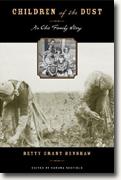Children of the Dust
Betty Grant Henshaw
book reviews:
· general fiction
· chick lit/romance
· sci-fi/fantasy
· graphic novels
· nonfiction
· audio books
· author interviews
· children's books @
curledupkids.com
· DVD reviews @
curledupdvd.com
newsletter
win books
buy online
links
home
for authors
& publishers
for reviewers

 |
Children of the Dust: An Okie Family Story Betty Grant Henshaw, ed. by Sandra Jean Scofield Texas Tech University Press Hardcover 229 pages October 2006 |
|
Oklahoma’s state centennial lies just below the horizon, on November 16, 2007. One of the famous aspects of Oklahoma history is the Dust Bowl era of the 1930s and the 1940s, when many Oklahomans (or Okies) left the state for a better life in California. John Steinbeck’s The Grapes of Wrath is set in this time period.
In her introduction to this book, Victoria Smith discusses these historical settings and parts of Oklahoma history that have influenced not only John Steinbeck but other authors as well. She concludes her introduction by talking about present-day conditions in Oklahoma and how they hearken back to those Dust Bowl days, when many Okies headed west on Route 66 for what they hope was the Promised Land: California. Betty Grant Henshaw gives her firsthand account of those Dust Bowl days and the great migration of Okies to California. Her memories are related in a very down-to-earth style typical of Oklahomans, enabling the reader to feel as if she or he has gone back in time to those days. People were, as they say, “dirt poor” - women wore dresses made out of flour sacks and such. Family was very important in those days, and many lived near each other. When family members decided to move West, it was a major trauma to the other members of the family. Many went West as a group, but many families were divided. That happened to this reviewer’s family, though to a lesser degree than in Henshaw’s case. The Oklahoma drought of the ‘30s killed plants and animals; once the plants, died the soil was easily whipped up by the wind, a situation unfortunately not unique to Oklahoma. After the Depression, Oklahoma and the federal government moved to improve the land situation there by damming up the Arkansas River and creating lakes. Today the eastern part of Oklahoma is green and humid. My father, who lived before the lakes were built, does not remember Oklahoma being as humid as it is now with the lakes. Western Oklahoma unfortunately does not have a major river like the Arkansas with which to create lakes, so it is still more arid there. When the wind whips up in Western Oklahoma or in the Texas Panhandle, the dust can block out the sun, reminding older people of the Dust Bowl days; we of younger generations get a glimpse of what it was like. Henshaw illuminates life lived during the Dust Bowl, what turned out to be the last straw forcing her family to move to California, and what life was like out there. There are several black and white photographs of Henshaw’s family, and a map of the United States that shows the route Okies took to get to California as well as the places in Oklahoma Henshaw lived. She and her family did not move to California until the ‘40s. Life was still hard with World War II going on, and it was not until after the War that things started to improve for Oklahoma. This book is highly recommended to those interested in Oklahoma history, the Dust Bowl, and Okies. Some Oklahomans find offense with “Okie” as a pejorative, but many - especially those in rural Oklahoma - consider it an honorable nickname. Some in Oklahoma consider it a step above Arkie and, of course, Texan. Originally published on Curled Up With A Good Book at www.curledup.com. © Br. Benet Exton, O.S.B., 2006 |
|
|
|
 Click here to learn more about this month's sponsor! |
|
| fiction · sf/f · comic books · nonfiction · audio newsletter · free book contest · buy books online review index · links · · authors & publishers reviewers |
|
| site by ELBO Computing Resources, Inc. | |
 The Great Depression of the 1930s was hard on many Americans and others throughout the world, but in Oklahoma it was devastating to those who tried to make their living on the land. There was a horrendous drought and hot summers; Oklahoma has glimpsed a reminder this past year. The drought helped to cause the wildfires that have burned up over 500,000 acres since November of 2005.
The Great Depression of the 1930s was hard on many Americans and others throughout the world, but in Oklahoma it was devastating to those who tried to make their living on the land. There was a horrendous drought and hot summers; Oklahoma has glimpsed a reminder this past year. The drought helped to cause the wildfires that have burned up over 500,000 acres since November of 2005.